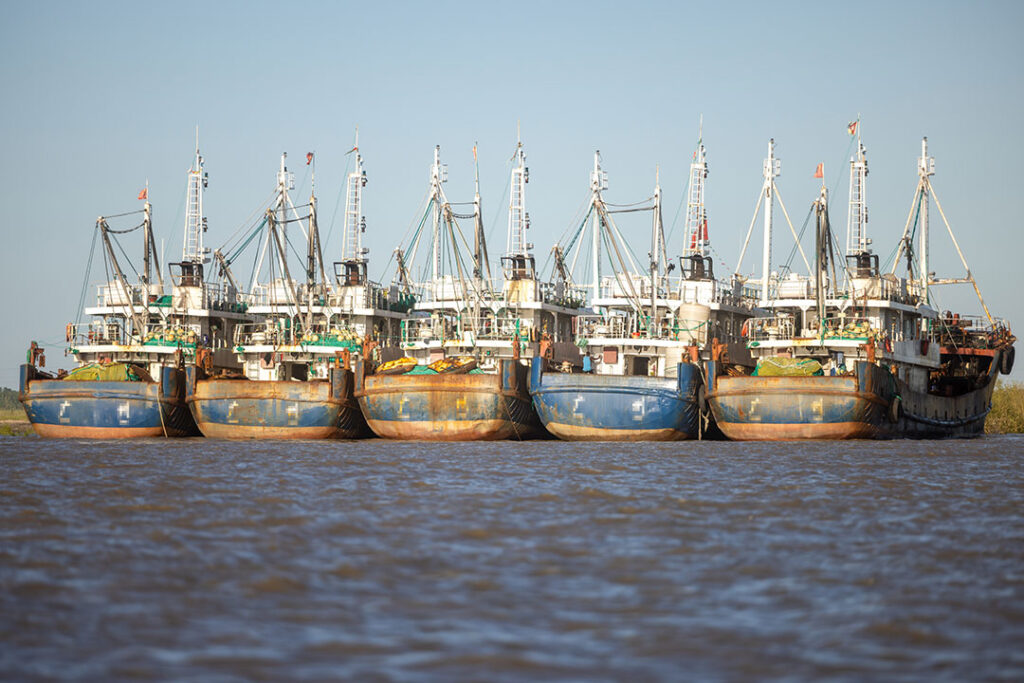ADF STAFF
Chinese trawlers frequently fish illegally throughout the southwest Indian Ocean and their captains and crews routinely abuse foreign workers on board.
New details about what goes on aboard the trawlers were revealed in a report by the Environmental Justice Foundation (EJF), which has for years documented illegal actions by China’s distant-water fishing fleet, by far the world’s largest.
The foundation interviewed 44 crew members from Indonesia and the Philippines who worked on 27 Chinese tuna ships in the southwest Indian Ocean between July 2017 to August 2023. In early 2024, it interviewed another 16 Mozambican fishermen who worked on Chinese trawlers in the region.
Each crew member said they witnessed some form of illegal, unreported and unregulated (IUU) fishing, including shark finning, which involves cutting off a shark’s fins then throwing the live shark back into the sea, a practice one member called “sadistic.” Shark fins are used in traditional Chinese medicine and as food.
During inspections, shark fins were often hidden in special compartments or freezers.
“It was obvious that we hid it, we had to keep it hidden,” a crew member told EJF. “Because when we were heading to Mauritius, there was an inspection, so we had to hide it very well […] because shark are protected animals.”
Another crew member expressed remorse over the killing of dolphins on board.
“Instead of killing them instantly, they were tortured,” he said. “They were cut […] then were let go.”
Crew members also reported the illegal use of artificial lights to catch tuna at night.
China is the world’s worst illegal fishing offender, according to the IUU Fishing Index. Of the top 10 companies engaged in illegal fishing globally, eight are from China.
Rampant illegal fishing by Chinese vessels in West Africa has decimated fish stocks and threatened the livelihoods of millions of people for decades. The scourge now costs the region up to an estimated $10 billion annually, according to the Stimson Center, a think tank. West Africa is now considered the world’s epicenter of illegal fishing.
‘It is not normal’
Each crew member interviewed by the foundation said they also witnessed or experienced some form of abuse on board, including physical violence, abusive working and living conditions, and being forced to work excessive overtime.
Chinese crew members routinely shouted and cursed at foreign crew members, particularly at inexperienced fishermen when they made small mistakes, or when someone got hurt or tired. They also often reported threats by the vessels’ captain and senior crew.
“The Chinese have no respect,” a Mozambican fisherman told EJF. “Aggression, hitting us while we work — the Chinese do that. I don’t know if that’s something that they see as normal, but for us Mozambicans it is not normal. [They] hit and insult the workers.”
Of the 44 Indonesian and Filipino fishermen interviewed, 41 said they were paid less than their contracted amount. One man said he was forced to sign a new contract with a lower wage after he boarded the vessel. Foreign crew members are typically recruited in exchange for a loan and are forced to pay back transport and living expenses. One man said he was left with $38.27 after seven months at sea due to salary deductions to repay his loan and because his guaranteed money was taken.
“I felt like a beggar when I returned home because I didn’t hold money at all,” he told the foundation.
Four Deaths Reported
Nearly every crew member described deplorable living conditions on board and a lack of food, drinkable water and medical supplies. They reported four deaths, including that of a man who was forced to work while ill.
“One day he passed out and he was brought to his room,” a crew member said. “The next day his feet were already swollen. A friend of mine who knew Chinese talked to the captain. The captain then headed to the port in Seychelles. The vessel was three days away from reaching the port, but he did not make it.”
The Chinese companies with the worst records of IUU and human rights abuses currently operating in the southwest Indian Ocean are Shandong Zhonglu, Zhejiang Ocean Family and the China National Agricultural Development Group, according to the foundation.
The EJF report offered a slew of recommendations to member states of the Indian Ocean Tuna Commission, including Comoros, Eritrea, Kenya, Madagascar, Mauritius, Mozambique, Seychelles, Sierra Leone, Somalia and Sudan.
Many of the recommendations involve strengthening or amending existing regulations meant to deter illegal fishing and to further improve monitoring, control and surveillance measures, such as establishing a “partially centralized vessel monitoring system and a high seas boarding and inspection scheme.”
The foundation also recommended that the commission adopt a resolution on labor standards in its fisheries.
In the exclusive economic zones of Kenya and Seychelles, tuna trawlers are commonly flagged to Seychelles but owned by Chinese nationals. It is a longstanding issue. The foundation recommended that states that act as local flags for Chinese fishing vessels require all fishing vessels to offer details on ownership arrangements and records on the destination of profits from fishing activities when applying for fishing licenses.
The foundation also called for greater transparency regarding investment into blue economy infrastructure, with information on financing, the parties involved and environmental and socio-economic affects made publicly available.

